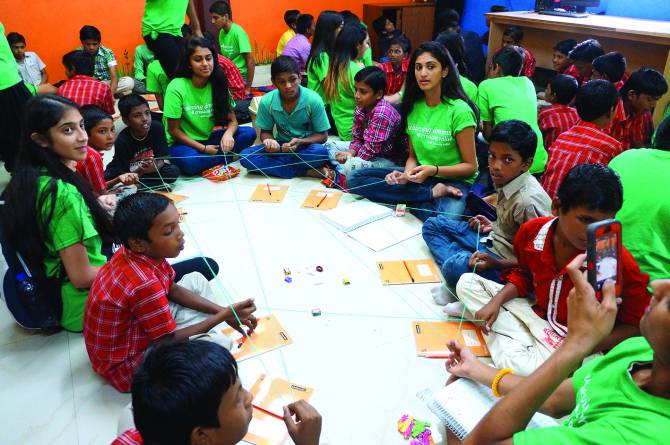
Chaya Babu meets the founder and volunteers of Uplift Humanity, a non-profit organisation that skills, mentors and teaches juveniles and orphans and helps them build self-esteem and honesty
A couple of weeks ago, about 50 American high school and college students travelled to India to volunteer at juvenile detention centres and orphanages as part of Uplift Humanity’s fourth year of operations.
This first group of students, to be followed by another in a few weeks, headed to Hyderabad and Vadodara to teach at-risk youth -- many of them same-age peers -- basic life skills that could assist them in assimilating back into society.
“The first day of the programme, the juveniles are just going to not pay attention,” said Anish Patel, founder of Uplift Humanity. “They’re going to talk back; because to them it’s like, ‘Who are you Americans to come into the facility and tell us how to act and how to learn?’ But by the end of the programme, every year, the last day is a highly emotional day. I think that really highlights how the peer-to-peer, brother-sister bond really develops throughout the three weeks.”
 |
Before the 18-day summer programme, the volunteers participate in a three-day orientation called Train the Trainers. They learn the content of the curriculum, how to communicate and interact with the juveniles, and how to be educators and mentors.
Once the two-and-a-half week curriculum begins, the teaching takes place in groups of two volunteers and five to six juveniles for about 5 hours a day.
While Uplift’s continuation programme that extends beyond the summer involves subject-based lessons on English, reading, writing, and computer literacy -- for which Uplift brought over 25 donated Dell laptops -- the current volunteers will be focussing on areas such as peer pressure, anger management, building self-esteem, honesty, and more.
“These are skills that these juveniles and orphans really need,” Patel explained, “because their low self-esteem for example is one of the reasons that they are institutionalised in these facilities. We feel that the best way to teach this stuff is through sharing personal experiences: While using the curriculum, also having a real dialogue with the kids. All of our curricula for the summer life skills programme are conversational and activity-based.”
“For example, one of the questions in our exam is, ‘You’re hungry on the street and there’s Rs 100 on a truck and the owner of the truck isn’t there right now. What do you do?’ We ask them situational questions that they face on an everyday basis to get an understanding of how they’d react. We ask these questions throughout the programme to track whether they’re growing and to gauge the effectiveness of our lessons.”
Krishna Dosapati, who volunteered last summer, said working through Uplift was a unique opportunity, different even from spending time in Indian orphanages on previous visits.
“They were a little bit more difficult to get through to,” said Dosapati, a junior at New York University, “because many of them were abandoned as children or had had other extremely traumatic pasts, which is why they committed the crimes that they did.”
She described a number of challenges, such as the culture shock. She and the other American students had to really step out of their box, she said, to gain a new perspective through which to relate to Indian kids. The language barrier was also a problem at times despite region-specific language proficiency being required for volunteers, but most difficult were the initial hurdles of getting the Indian kids to trust their American peers enough to learn from them.
“They’re our age, and we’re telling them all this stuff about honesty and self-esteem,” Dosapati said, “and in the beginning they’re like, ‘This is stupid, why should I listen to you?’ But as we worked with them and actually taught them every single day, interacted with them and connected with them -- I remember some of us sharing our own experiences -- that helped them open up to us.”
“Some of them told us really intimate stories, such as how both of their parents died when they were young and they ended up living on the streets or in slums and how they got into crime, things like that. It was really eye opening.”
Though Uplift’s goal is to reduce recidivism rates in India, right now they don’t have any way of tracking what happens to those who leave the facilities. Still, there are a number of instances of success, reported by released juveniles themselves.
Sejal Shah, executive director and advisor to the volunteers, described one young man paying a visit to a facility he had been released from a year prior, specifically to thank Uplift. He had heard the group was back and came to share the news that he had started his own incense business rather than making money through street crime.
“To know that we made a direct impact in someone’s life is so powerful,” Shah said. “The other part that always hits me in the heart is when I see the bond that is created between two very different cultures. The first few days we are at the facility it is a bit awkward for our students and the facility students, but then before you know it they start creating a bond with each other.”
“Both the Uplifters and the children at the facility open up to each other and truly start caring about one another, wanting to learn about one another. Inevitably on our last day there, both sides cannot stop the flow of tears… I am always amazed at the positive effect both Uplifters and children from the facility have on each other.”